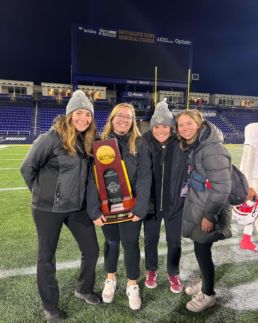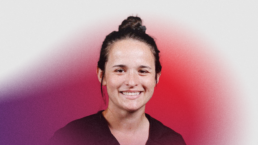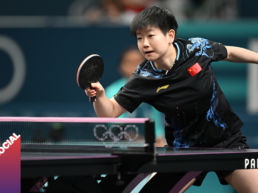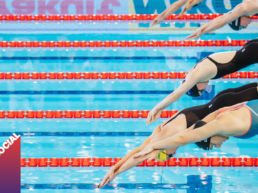Welcome to the Redtorch She Moves The Game Spotlight Series, where we shine the light on incredible women working in sport.
In our latest interview, Sarah Finkel explains her journey to becoming a professional athletic trainer.
Her entire life has been devoted to sport and she is determined to be a role model for young women hoping for a career in what is so often a male-dominated area.
Can you tell me about your current role and the work you do at North Central College?
I’m currently an athletic trainer at North Central College (NCC), Illinois which involves diagnosing, preventative rehab and using therapeutic interventions on student athletes. I’m assigned to the soccer and softball teams this year but was previously involved mainly with the American football team.
We hold clinics for athletes across all sports – as there are 1,000 student athletes on the NCC campus, I get to be part of all the sporting programs.
Can you share something about your career journey?
I’ve always envisioned having a career in sport, so I built athletic training connections during high school and was lucky enough to learn about sports medicine. I knew my playing career would come to end, so it was crucial for me to discover a role other than participating on the field.
When I got to NCC I was inspired by the athletic training team, mostly led by women. It was motivating to work with powerful and inspiring women who had established careers in sport and who were respected by male coaches and athletes.
A lot of this has to do with Heidi Matthews, NCC’s head athletic trainer from 1993-2000. And in 2002, NCC was the first college in Chicago to gain accreditation for an athletic training program which still runs today as a two-year Masters. If it wasn’t for Heidi, I probably wouldn’t be where I am today.
What have been the most significant milestones in your career?
At NCC, I was part of the American football team that won the 2022 DIII national championship at the Navy-Marine Corps Memorial Stadium in Maryland. Having watched them win the championship in 2019, it was incredible to play a part this time around.
I was lucky enough to be part of the NCC track and field team that competed at the 2023 national championships at St. John Fisher University in Rochester, NY. Having been able to play a role in major college sporting events, I’m excited to see where it takes me next.
I am also proud to advance my career by taking vestibular rehabilitation and concussion management courses. With rising awareness in these issues – and having suffered multiple concussions myself – I am keen to provide the best possible care as an athletic trainer.

What are you most excited about in the world of athletic training?
There has been a great deal of additional appreciation for the role of athletic trainers recently, partly due the rise in serious injuries at both amateur and professional levels. A prime example is when Buffalo Bills safety, Damar Hamlin, suffered a cardiac arrest in January 2023. He would have died on the field were it not for the quick reactions of the athletic training team, especially those of Denny Kellington who performed CPR on Hamlin and ultimately saved his life.
Afterwards, it seemed there was a greater awareness of athletic trainers and a greater understanding of the importance of the role. Let’s hope it might lead to future job openings and improved pay.
Is there anything that social media platforms do to promote female athletic trainers?
Not specifically, but professional teams do post about the role, perhaps more than previously. March is known as ‘National AT month’, when lots of teams publish appreciation posts and team profiles – that’s great to see.
Although not exactly related to social media, the Netflix series ‘Quarterback’ and ‘Receiver’ have provided great insights into what athletic trainers do behind the scenes. People don’t often realise how much work goes on before and after a gameday, especially when addressing the needs of individual athletes in multiple sports.
How do you envision the future of women’s athletic training over the next 10 years?
I think an ever-increasing number of women will be in leadership roles across the major sports. MLB’s Miami Marlins are currently led by General Manager Kim Ng and President of Business Operations Caroline O’Connor, who are making history in heading up the sports and business fronts of a major men’s franchise.
After spending 15 years in WNBA, Courtney Watson is now NBA’s Head of Athletic Training for the Portland Trailblazers. As more women take up these roles, I can even envisage a female Head of Athletic Training in what is arguably the most male-dominated sport: the NFL.
Can you describe any challenges you have faced as a woman in the sports industry, and how you have overcome them?
When I worked in high school, several parents, fans and even opposing coaches were sceptical that a women could be an athletic trainer. This resulted in inappropriate comments and doubts about my credentials, but fortunately I was able to lean on my colleagues for support. Although these incidents are more commonplace in a high school setting, there comes a point when you must put your hard hat on and push through. Basically, I’m here because I’m qualified and know what I’m doing.
I’d also mention the pay discrepancy between women and men as a key challenge. It is often the case that women are paid less than men even when performing the same role.
What are the most significant barriers women face getting into the sports industry?
Although major steps have been taken towards inclusivity for women in major sports, there is still much to be done. There will probably always be some people who believe women aren’t qualified for these key roles, but with a rise in the number of women taking on such positions, there are now role models and achievable goals for younger women.
As mentioned, gender pay discrepancy is another barrier that might stop women wanting to pursue a career in sports.
If we want more women in sport, we need to continue breaking down barriers, but it’s important to also acknowledge how far women have come, too. We have built a huge ceiling of potential, something I could never have imagined when I was younger.
What steps can be taken to promote women’s involvement in the sports industry?
Equal pay is key. Promoting women athletic trainers on social media is something that needs addressing. Although there are currently many more role models, the younger generation are on social media all the time: make use of this to celebrate female athletic trainers and provide inspiration to young women.
What advice would you give to women who want to kickstart or progress their career in the sports industry?
Vouch for yourself and your skills and keep proving people wrong! Sometimes they won’t believe in you and all you can do is continue to push through.
Make as many connections as you can as it’s useful to know other women in the profession. Seek advice, talk about experiences and gain job opportunities through these connections.
Find role models who can motivate you to progress wherever you want to go.
What social media trends or changes do you anticipate in the future of women’s sport?
It’s important that women’s sport is increasingly discussed on social media – as already witnessed in the rise of popularity for WNBA. I was seeing highlight clips and player performance graphics multiple times a day during the season, which hasn’t really happened before.
I see mostly women’s soccer and basketball online, but it would be great to see other women’s sports, like volleyball and softball, promoted on social media. They certainly have the potential to bring in bigger audiences if the structure is there for them to do so.
What essential resources do you use and which women in sport have inspired you?
First, find role models in the field you want to pursue. I’ve already mentioned the impact of Heidi Matthews. Tiffany Morton, assistant athletic trainer for NFL’s Kansas City Chiefs, is also an inspiration. When I see her working on the sidelines, I know one day that could be me.
Perhaps the most important resource is other women in sport in a similar position to you. Ask them about their journey and experiences and learn about any challenges you might face and how to overcome them.





